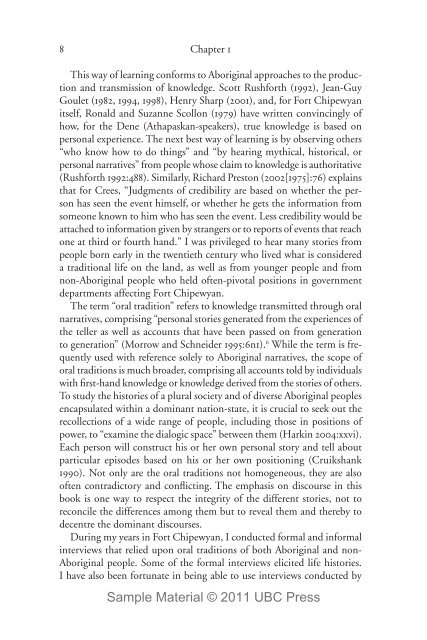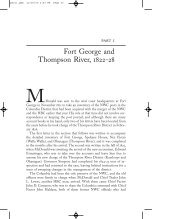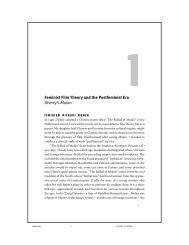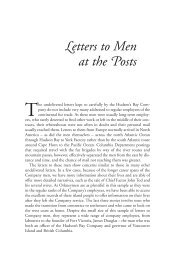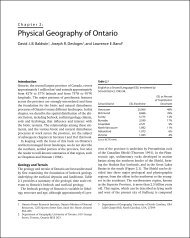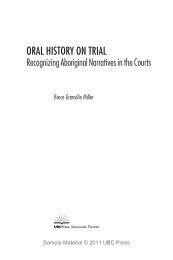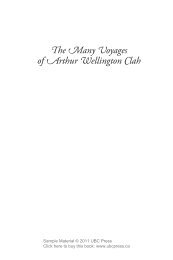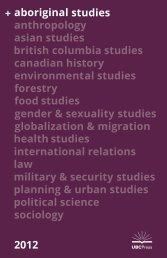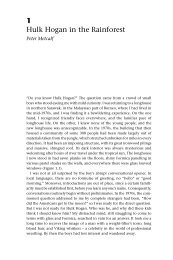Fort Chipewyan and the Shaping of Canadian History ... - UBC Press
Fort Chipewyan and the Shaping of Canadian History ... - UBC Press
Fort Chipewyan and the Shaping of Canadian History ... - UBC Press
You also want an ePaper? Increase the reach of your titles
YUMPU automatically turns print PDFs into web optimized ePapers that Google loves.
8 Chapter 1<br />
This way <strong>of</strong> learning conforms to Aboriginal approaches to <strong>the</strong> production<br />
<strong>and</strong> transmission <strong>of</strong> knowledge. Scott Rushforth (1992), Jean-Guy<br />
Goulet (1982, 1994, 1998), Henry Sharp (2001), <strong>and</strong>, for <strong>Fort</strong> <strong>Chipewyan</strong><br />
itself, Ronald <strong>and</strong> Suzanne Scollon (1979) have written convincingly <strong>of</strong><br />
how, for <strong>the</strong> Dene (Athapaskan-speakers), true knowledge is based on<br />
personal experience. The next best way <strong>of</strong> learning is by observing o<strong>the</strong>rs<br />
“who know how to do things” <strong>and</strong> “by hearing mythical, historical, or<br />
personal narratives” from people whose claim to knowledge is authoritative<br />
(Rushforth 1992:488). Similarly, Richard Preston (2002[1975]:76) explains<br />
that for Crees, “Judgments <strong>of</strong> credibility are based on whe<strong>the</strong>r <strong>the</strong> person<br />
has seen <strong>the</strong> event himself, or whe<strong>the</strong>r he gets <strong>the</strong> information from<br />
someone known to him who has seen <strong>the</strong> event. Less credibility would be<br />
attached to information given by strangers or to reports <strong>of</strong> events that reach<br />
one at third or fourth h<strong>and</strong>.” I was privileged to hear many stories from<br />
people born early in <strong>the</strong> twentieth century who lived what is considered<br />
a traditional life on <strong>the</strong> l<strong>and</strong>, as well as from younger people <strong>and</strong> from<br />
non-Aboriginal people who held <strong>of</strong>ten-pivotal positions in government<br />
departments affecting <strong>Fort</strong> <strong>Chipewyan</strong>.<br />
The term “oral tradition” refers to knowledge transmitted through oral<br />
narratives, comprising “personal stories generated from <strong>the</strong> experiences <strong>of</strong><br />
<strong>the</strong> teller as well as accounts that have been passed on from generation<br />
to generation” (Morrow <strong>and</strong> Schneider 1995:6n1). 6 While <strong>the</strong> term is frequently<br />
used with reference solely to Aboriginal narratives, <strong>the</strong> scope <strong>of</strong><br />
oral traditions is much broader, comprising all accounts told by individuals<br />
with first-h<strong>and</strong> knowledge or knowledge derived from <strong>the</strong> stories <strong>of</strong> o<strong>the</strong>rs.<br />
To study <strong>the</strong> histories <strong>of</strong> a plural society <strong>and</strong> <strong>of</strong> diverse Aboriginal peoples<br />
encapsulated within a dominant nation-state, it is crucial to seek out <strong>the</strong><br />
recollections <strong>of</strong> a wide range <strong>of</strong> people, including those in positions <strong>of</strong><br />
power, to “examine <strong>the</strong> dialogic space” between <strong>the</strong>m (Harkin 2004:xxvi).<br />
Each person will construct his or her own personal story <strong>and</strong> tell about<br />
particular episodes based on his or her own positioning (Cruikshank<br />
1990). Not only are <strong>the</strong> oral traditions not homogeneous, <strong>the</strong>y are also<br />
<strong>of</strong>ten contradictory <strong>and</strong> conflicting. The emphasis on discourse in this<br />
book is one way to respect <strong>the</strong> integrity <strong>of</strong> <strong>the</strong> different stories, not to<br />
reconcile <strong>the</strong> differences among <strong>the</strong>m but to reveal <strong>the</strong>m <strong>and</strong> <strong>the</strong>reby to<br />
decentre <strong>the</strong> dominant discourses.<br />
During my years in <strong>Fort</strong> <strong>Chipewyan</strong>, I conducted formal <strong>and</strong> informal<br />
interviews that relied upon oral traditions <strong>of</strong> both Aboriginal <strong>and</strong> non-<br />
Aboriginal people. Some <strong>of</strong> <strong>the</strong> formal interviews elicited life histories.<br />
I have also been fortunate in being able to use interviews conducted by<br />
Sample Material © 2011 <strong>UBC</strong> <strong>Press</strong>


